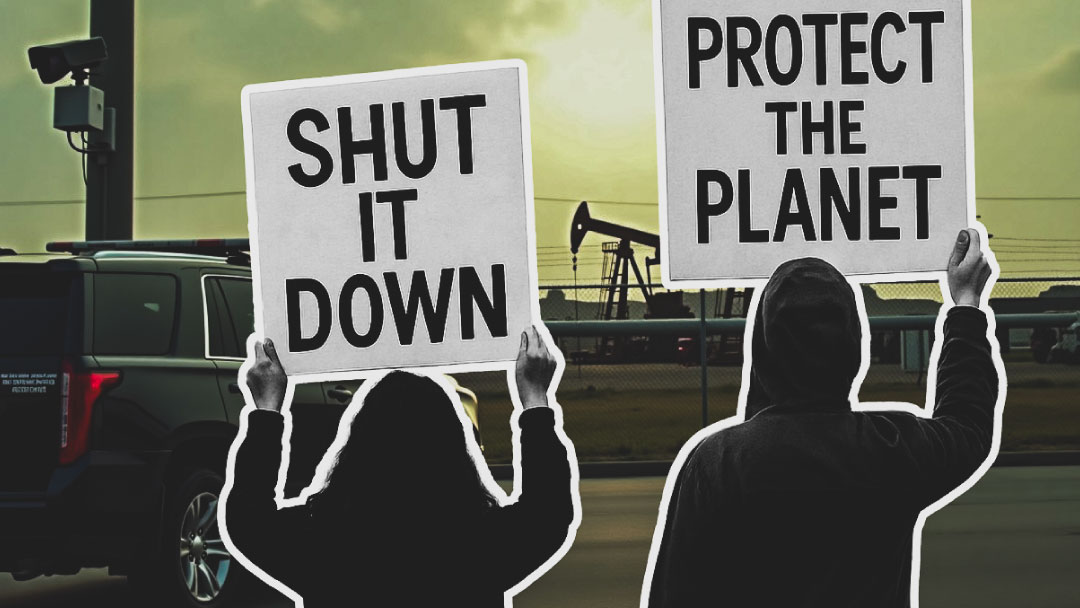Preventing Eco-Terrorism in Oil & Gas Operations
Preventing Eco-Terrorism in Oil & Gas Operations
The Growing Threat to Energy Infrastructure
Eco-terrorism in oil and gas is not the same as peaceful protest. It involves direct action—often unlawful and sometimes dangerous—targeted at disrupting or damaging operations in the name of environmental activism. For oil and gas companies, this form of extremism presents a growing risk, especially as infrastructure becomes more visible and contentious in the public eye.
From attempted valve shut-offs on pipelines to unauthorized drone surveillance over production sites, these incidents are no longer rare. The oil and gas sector operates under heightened scrutiny, making it a frequent target. Now more than ever, companies must take proactive security measures to protect their people, assets, and ability to operate safely.

What Does Eco-Terrorism Look Like in Practice?
While the word “terrorism” may conjure extreme scenarios, many eco-activist tactics are subtle yet effective at causing disruption. Common methods include:
- Trespassing onto remote pipeline access points
- Blocking facility entrances with large-scale demonstrations
- Tampering with safety systems or valves
- Using drones to monitor or intimidate personnel
- Coordinating cyber and physical actions for maximum exposure
These actions not only risk operational downtime and equipment damage, but they also raise serious safety concerns. A well-intentioned protester can inadvertently trigger a hazardous materials incident or endanger on-site personnel, especially in areas involving high pressure or flammable substances.
Key Vulnerabilities in Oil & Gas Facilities
Energy operations are complex ecosystems, and not all areas are equally protected. The most vulnerable include:
- Remote pipeline segments that lack daily oversight
- Unstaffed compressor stations or storage tanks
- Accessible valve points located along public easements
- Refineries or terminals positioned near urban populations
These sites often rely on perimeter fencing and occasional patrols—insufficient deterrents when facing a determined activist group. Additionally, the public nature of permitting processes can make site locations easily discoverable.
Proactive Security Strategies That Work
At GPI Defense, we believe the best defense is built before an incident occurs. Oil and gas companies can take the following proactive steps to deter eco-terrorism threats:
- Comprehensive Risk Assessments: Evaluate facility access points, visibility, and surrounding community sentiment.
- Layered Surveillance: Combine real-time monitoring with motion-triggered alerts, especially for unmanned or rural areas.
- Controlled Access Systems: Restrict unauthorized entry with badge readers, vehicle barriers, and access logs.
- Mobile Patrols and Rapid Response: Use roving guards who can monitor wide areas and respond to alerts immediately.
- Scenario Planning: Train internal teams on what to do in the event of a blockade, protest, or breach.
These measures reduce vulnerability, speed up response times, and send a clear message that the site is protected.
Why Partner With a Private Security Firm
Many oil and gas firms question whether to build an in-house security team or outsource protection. While both options have their merits, partnering with an experienced private security provider offers several distinct advantages.
GPI Defense specializes in long-term, value-driven partnerships. We are not the cheapest provider, but we are known for our consistency, professionalism, and reliability. For high-risk industries like oil and gas, quality matters. Our officers are trained specifically for energy sector scenarios and work closely with on-site leadership to adapt to changing threat landscapes.
Outsourcing to a firm like ours means gaining a partner who is already equipped, insured, and compliant—without the cost and complexity of managing a full internal security team.
When Prevention Pays Off
Picture a remote pipeline construction site flagged by social media chatter as a likely protest location. Instead of waiting to see what happens, the company brings in GPI Defense. We conduct a rapid site assessment, install temporary surveillance, and assign two mobile officers to patrol at staggered intervals.
Over the course of several days, a protest does occur—but thanks to visible deterrents and strong coordination with local law enforcement, no one crosses the perimeter. No equipment is damaged. No operations are delayed. The cost of prevention is far less than the cost of cleanup and lost time.
This is the kind of result proactive security planning delivers.
What Energy Security Leaders Should Do Now
Security is not just the job of the guard force. Operations and facilities managers play a key role in ensuring preparedness. We recommend the following next steps:
- Establish regular contact with local law enforcement and emergency response teams
- Monitor social media and activist chatter related to your projects
- Ensure all staff are trained to handle protestor encounters safely and legally
- Keep site maps, emergency protocols, and contact trees up to date and easily accessible
Being prepared doesn’t just protect assets. It protects reputations, shareholder confidence, and team morale.
A Secure Operation Is a Resilient Operation
The oil and gas industry operates under immense public, regulatory, and financial pressure. Eco-terrorism only adds to that complexity. But with the right planning, these risks can be managed effectively.
At GPI Defense, we help companies build resilience through thoughtful, professional security services tailored to their specific vulnerabilities. By investing in proactive security today, energy leaders can safeguard tomorrow’s operations—and the teams that keep them running.
Contact us to schedule a site evaluation or learn more about how we protect critical energy infrastructure from emerging threats.
“At GPI Defense, we protect more than just property… we actually safeguard your business from financial risks, theft, and legal liabilities.”